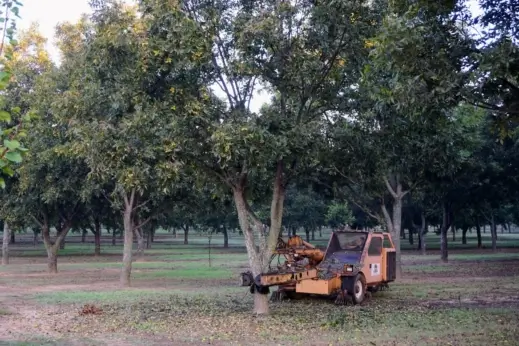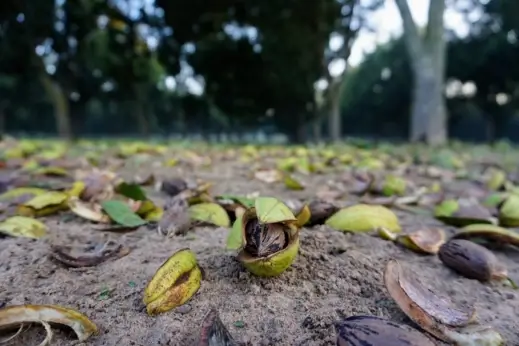Wild pecans (Carya illionoisnensis) is the one main nut native to North America (that’s, relying on who you discuss to. Some say it is the one native nut, whereas others say the black walnut is japanese America is a local species). These drought-resistant bushes develop in a belt stretching from northern Mexico to northern Illinois, with pecan bushes peaking in Texas, New Mexico and Georgia.


Bushes shake in late October at Sorrells Farms in Comanche, Texas. Picture courtesy of the Texas Pecan Growers Affiliation.
Plant-based milk has been fashionable out there for the previous 15 years; One 2020 analysis notice that they account for 15% of complete dairy gross sales and 35% of the plant-based meals class, in complete 2.6 billion USD in gross sales.
And there are many dairy options on the market. Almonds, pistachios, macadamia nuts, hazelnuts, walnuts, cashews, peanuts, soybeans, peas, potatoes, oats and hemp are simply a few of the choices for many who hand over conventional milk. Nonetheless, pecan milk is sort of absent from the plant milk market.


“I felt like pecans had no place out there as a result of there was no grower or company with a big provide of nuts to show milk right into a nationwide or international product,” Kortney Chase mentioned. Rising up in southeastern New Mexico, her household harvested pecans from their farm and made creamy milk from the buttery-flavored nuts. Households will add it to cereal or drink it straight. Years later, Chase needed to share her love of pecan milk with the world, so she launched it pecanon the finish of 2023.


Kortney Chase. Pictures by Samantha Marie.
Prior to now, folks have tried to introduce pecan milk into the plant-based area with various levels of success. 2014, Houston MALK natural turned the primary model to provide pecan milk, though manufacturing was later discontinued; The corporate at the moment produces almond milk and oat milk. In 2015 and 2016, Atlanta turned residence Pure tree home And Pecan Milk Cooperative, corresponding. The previous is at the moment the one model that produces canned pecan milk.


Pecana sources its pecans immediately from its personal farm—the identical orchards the place Chase grew up. As a 3rd era pecan farmer, the Chase household began Chase pecans in Artesia, New Mexico, in 1986. In 2003, Chase Pecan moved from New Mexico to San Saba, Texas, the self-proclaimed “Pecan Capital of the World.” The Hill Nation city is residence to the oldest fossil pecans on document; Ruins found on the banks of the Colorado River at San Saba are estimated to be a minimum of 65 million years previous.
Nonetheless, pecans have a particular place for Texans specifically; in 1919, it was declared the state tree due to its position in Texas heritage, economic system, and tradition. Pecans had been additionally an necessary meals supply for the area’s indigenous folks, whose upstream commerce routes expanded the nut’s habitat and finally its agricultural terrain. However Texas pecan growers do dealing with difficulties in recent times resulting from local weather change, crop enter prices, water prices and labor shortages.


Pecan bushes in Brownwood, TX. Pictures by way of Texas Pecan Growers Affiliation.
Chase pecans is at the moment the main pecan grower, with 13,000 acres of farmland together with leased orchards and small household farms in Texas, New Mexico and Arizona, with roughly 3,000 acres devoted to natural farming. The corporate focuses on Pawnee (a big, buttery nut popularized within the Western states by Kortney Chase’s father, Richard) and Western Schley pecans (a small, crunchy nut). Additionally it is one of many largest pecan producers, harvesting a mean of 20 million kilos of nuts annually, guaranteeing Pecana has a gentle provide.
After graduating from faculty in 2011, Chase started finding out the manufacturing facet of the household enterprise, in addition to market analysis and gross sales. “I have a look at sure merchandise like nut milks and marvel why they don’t seem to be made with pecans,” she says.
Nonetheless, it wasn’t till the pandemic that Chase began making a “business nut milk I needed to drink.” Though larger in fats and energy than almonds, walnuts, hazelnuts and cashews, pecans make an undeniably creamy milk and, in contrast to oats, they do not require any additions. canola oil or sunflower oil to create a product of comparable consistency.


Pecan manufacturing. Pictures by way of Chase Pecan.
As a result of pecan milk is so new to the market, there may be little information evaluating it to different plant-based milks, however pecan’s decrease environmental affect and lengthy manufacturing cycle bode effectively for the way forward for the trade. It takes pecan bushes 5 to seven years to provide fruit, however they will produce fruit for as much as 300 years. In distinction, almond bushes don’t bear fruit for 3 years and have a mean manufacturing interval of 25 years, whereas walnut bushes within the UK bear fruit after 4 to seven years and have a manufacturing interval of 30 years.


Pecans are additionally wind-pollinated, which means the tree can reproduce with out human or insect intervention. These cross-pollinated bushes yield bigger, higher-quality backyard nuts (business pecan varieties are hybrids developed by managed pollination).
almondsConversely, pollinators are wanted for copy. California produces 80% of world almond manufacturing, aided by imports of European honey bees, which then compete with and change native species. Imported bees additionally die in massive numbers from publicity to pesticides, parasites and illness.


Nuts fall to the bottom after bushes shake on the Sorrells Ranch in Comanche, Texas. Staff at Sorrells Farms will now herald harvesting gear to reap contemporary crops. Pictures by way of Texas Pecan Growers Affiliation.
It doesn’t matter what kind of plant milk you eat, “normally, all tree nuts and legumes are sustainable,” says Dana Ellis Hunnes, a registered dietitian and assistant professor at UCLA’s Fielding Faculty. from backyard to manufacturing than some other animal milk.” of Public Well being. “Nonetheless, the sustainability of 1 kind of seed or legume varies from one other as a result of some require extra water than others, however tree seeds are carbon sinks as a result of bushes pull carbon out of the ambiance and get into their roots. Plant milk additionally requires 50% much less water and as much as 10% much less land than cow’s milk and produces minimal greenhouse gases.”
Though cow’s milk shouldn’t be demonized, it does include its personal extra vital environmental footprint. “The principle cause is you must feed pregnant or lactating animals extra meals, and this does not work,” Hunnes mentioned. “When you think about water use, emissions produced by animals and land use, plant-based milk will all the time win.”
